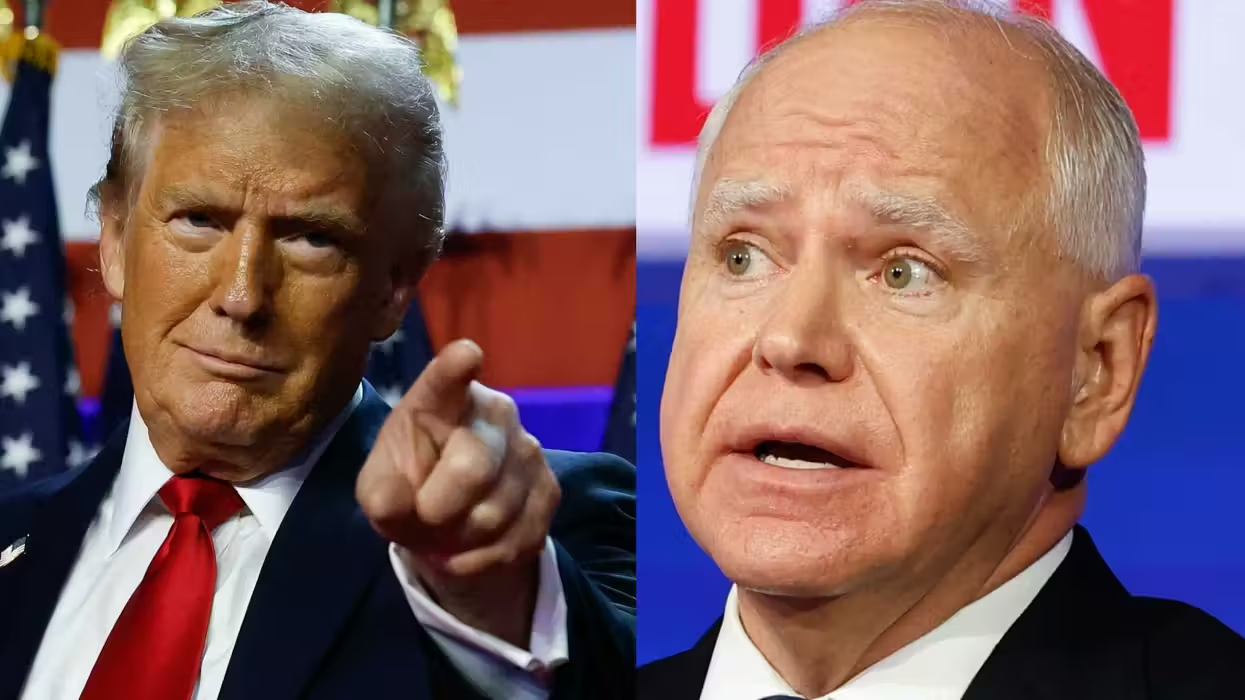
© 2025 Blaze Media LLC. All rights reserved.
Keynes v. Hayek: A leader of the conservative movement on the epic battle past and present
July 15, 2015
James Piereson on America's "shattered consensus."
James Piereson, president of the William E. Simon Foundation and senior fellow at the conservative Manhattan Institute think tank has a new book out in which he makes the case that the political, ideological and cultural consensus that has enabled the last seven decades of American growth and prosperity is coming apart at the seams.
Part of his new "Shattered Consensus: The Rise and Decline of America�s Postwar Political Order" deals with two economic titans whose philosophies animate the two sides that Piereson sees as currently at loggerheads in America: John Maynard Keynes and Friedrich Hayek.
We had the chance to conduct an in-depth interview with Piereson, during which we asked him to expound upon the impact of these two figures both on the past and present. Here is what he said:
I spend a couple of chapters on Keynes, and a chapter on Hayek. And I don't really attack Keynes in the book - I try to elucidate his ideas, and I try to explain why Keynes' ideas probably don't work in the current period for political reasons, not economic reasons.I got some of my ideas from Keynes frankly. Keynes wrote a book on World War I called "The Economic Consquences of the Peace," in which he basically argued that the events of World War I destroyed the 19th century economic order of free markets and limited government. And he said that for a lot of reasons: One, the European economies were wrecked. All the gold in the world -- a lot of it -- had moved to the United States. The capital that had been accumulated in that period was destroyed. And he felt that the states and governments in the future would have to take [a] much greater role in guiding economic growth and investment than in the past. And he had a lot of reasons for that.
What I suggest is that in a period in which government spends a great deal -- and we've had 70 years of it going back to the '30s and '40s, and interest groups have organized around the state to get that money -- Keynesian stimulus policies don't work that well because all the money goes to entrenched interests, many of which are trying to block economic growth to begin with. They're trying to get tax breaks. It goes to public employee unions who don't want to see any change. And so therefore, in this context, stimulus spending only creates more roadblocks to growth, when what in fact we need to do is break up the interest group system and free up our economy.Hayek of course attacks all these Keynesian ideas. He didn't think planning was possible. And he thought the Keynesian remedies would simply lead to more inflation. He's been partly right on that -- I'm not sure he's been totally vindicated -- but what happened in the wake of the financial crisis was that Keynes came back full bore as if he had never been discredited. People thought his theories had been discredited in the 1970s. But Barack Obama came back with stimulus packages and all sorts of things designed to stimulate demand. And it hasn't worked very well.
For a theory that is as influential as Keynes's, it's got a very mixed record. Japan of course has tried all sorts of Keynesian stimulus remedies -- since 1990, has not worked out very well. Great Britain tried them in the 1960s -- they failed. Jimmy Carter tried them in the United States in the 1970s -- they failed. One could point to the 1960s -- Kennedy and Johnson, especially Kennedy's tax cut as a success -- but of course he did that via tax cut, not by spending. FDR's policies were too experimental and episodic to be chalked up to Keynesian remedies.
But these two things continue to battle -- the two political parties represent the different prongs of these two theories. The Democrats want to stimulate growth by more spending; the Republicans by freeing up the economy. And at the end of the day the voters will decide.
I've stated in the book where I stand. I don't think the Keynesian remedies will work in our circumstance, even though I think we'll continue to try them.
When pushed based on comments from the likes of the New York Times' Paul Krugman to the effect that the federal government has not thrown enough money at "stimulus" programs to make Keynesianism work in modern-day America, Piereson continued:
"We've thrown an enormous amount of Keynesian style stimulus at this problem without a great deal to show for it."
I think that's absurd ... the idea that the United States has followed a policy of austerity is not accurate. We ran up in '08, '09 and 2010, we ran up annual federal deficits of 10 to 15 percent of GDP -- a trillion dollars. That's enormous amounts of "stimulus."The Federal Reserve has been buying up bonds -- not only government bonds but bad mortgages and all sorts of things. The balance sheet of the Fed is now up to $4 or $5 trillion -- unprecedented amounts. And of course we've had interest rates at basically zero for six or seven years.
So, we've thrown an enormous amount of Keynesian style stimulus at this problem without a great deal to show for it, and this again gets back to the problem. We need to find a way to generate private sector growth. We're gonna run out of Keynesian ammunition pretty soon if we haven't run out of it already.
During the interview, which you can listen to in full below, we also had the chance to speak with Piereson about several other topics including:
- The events in Greece and their relevance to America
- Piereson's theory of American history and politics
- Whether a crisis will precipitate an American rebirth or benevolent dictatorship
- The American economy
- The state of the war of ideas between conservatives and leftists
- And much more
Note: The link to the book in this post will give you an option to elect to donate a percentage of the proceeds from the sale to a charity of your choice. Mercury One, the charity founded by TheBlaze’s Glenn Beck, is one of the options. Donations to Mercury One go towards efforts such as disaster relief, support for education, support for Israel and support for veterans and our military. You can read more about Amazon Smile and Mercury One here.
–
Follow Ben Weingarten (@bhweingarten) and TheBlazeBooks on Twitter and Facebook.
You can find all of our Blaze Books interviews on Soundcloud and Stitcher, and subscribe to our podcast automatically via iTunes.
Want to leave a tip?
We answer to you. Help keep our content free of advertisers and big tech censorship by leaving a tip today.
Want to join the conversation?
Already a subscriber?
Ben Weingarten is a writer, commentator, and editor at large at RealClearInvestigations. He is a senior contributor at the Federalist and writes columns for Newsweek and the Epoch Times.
Ben Weingarten
Ben Weingarten is a writer, commentator, and editor at large at RealClearInvestigations. He is a senior contributor at the Federalist and writes columns for Newsweek and the Epoch Times.
more stories
Sign up for the Blaze newsletter
By signing up, you agree to our Privacy Policy and Terms of Use, and agree to receive content that may sometimes include advertisements. You may opt out at any time.
Related Content
© 2025 Blaze Media LLC. All rights reserved.
Get the stories that matter most delivered directly to your inbox.
By signing up, you agree to our Privacy Policy and Terms of Use, and agree to receive content that may sometimes include advertisements. You may opt out at any time.






